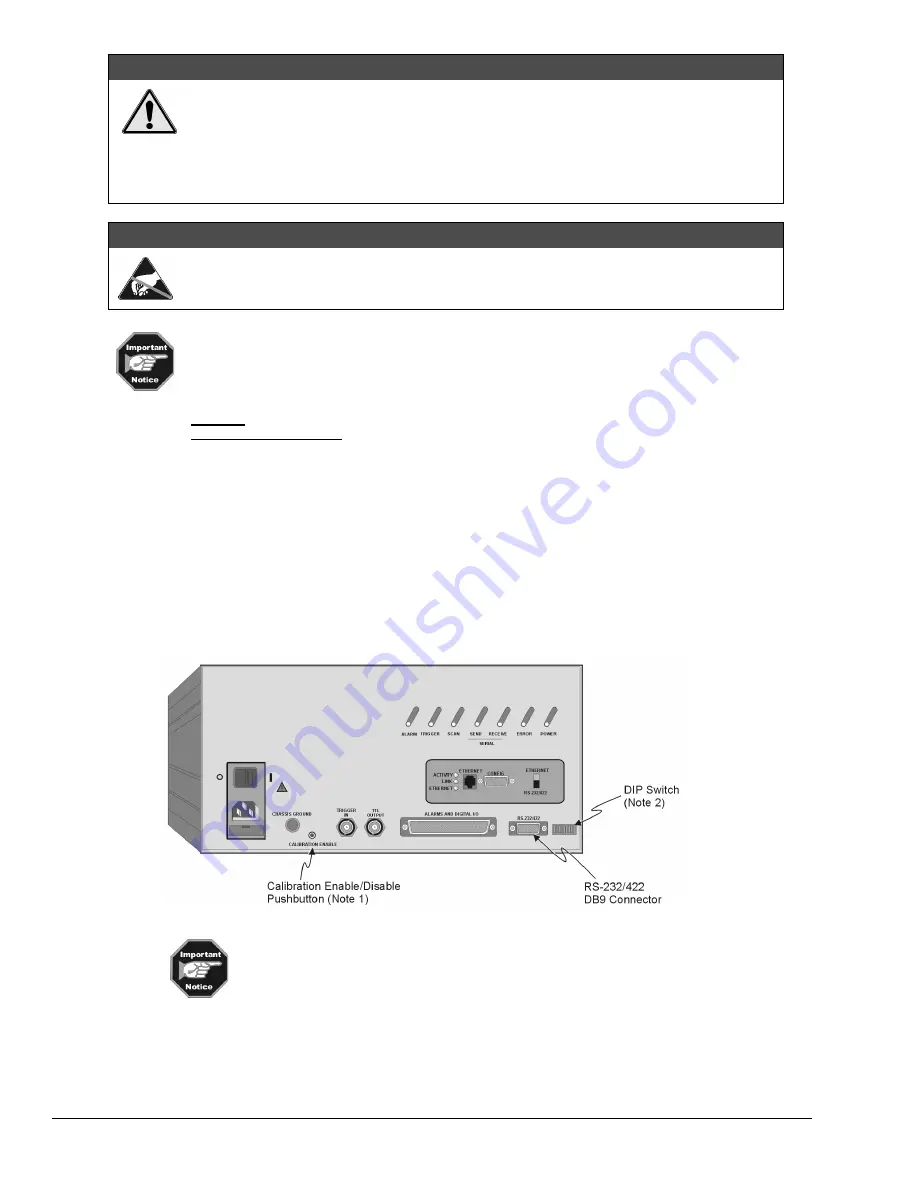
6-2 Calibration
NetScan User’s Manual
&$87,21
The digital voltmeter (or digital multimeter) used to verify calibration voltage accuracy
must meet the following criteria:
1)
Minimum Resolution: 6-1/2 digits
2)
Minimum DC Accuracy: 0.005% full scale
Failure to comply with this requirement can result in faulty equipment performance and
necessitate additional services of an authorized metrology lab.
&$87,21
Use approved ESD precautions, including static-free work area and grounded wrist strap,
when handling circuit boards and electronic components. Failure to do so could cause
equipment damage due to electrostatic discharge.
The main main unit and each signal conditioning card are calibrated separately.
Note that the main unit and its signal conditioning cards contain components for saving
calibration constants, allowing for card swapping within a system, card swapping between
systems, and system expansion. Calibration relates to the main unit and cards as follows:
Main Unit: NetScan or ChartScan main chassis, calibrated for offset and gain only.
Signal Conditioning Cards: Calibrated for offset, gain, and cold junction sensor offset (if thermocouples
are used).
Non-Volatile Storage of Calibration Constants
To preserve calibration constants, main unit constants are stored in an on-board battery backed up RAM
and the constants for each signal conditioning card are stored on the card’s EEPROM.
Hardware Protected RAM
Your scanning device contains a security circuit. This circuit disables writing to the portion of battery
backed up RAM which holds the main unit’s calibration constants and calibration password. You must
enable the calibration mode prior to calibrating the main unit or changing the password.
NetScan, Rear Panel
To enable calibration, locate the Calibration Enable/Disable Pushbutton. (ChartScan User’s
see notes 1 and 2, below). Push the button so it is in the indent position. This enables
writing to RAM.
Note 1: ChartScan users only. Early production ChartScan units do not have a Calibration Enable/Disable Pushbutton.
For units with no calibration pushbutton, a DIP Switch is used instead of the pushbutton, as described in
note 2. ChartScan units that do have the pushbutton will have it located on the rear panel, as in the above
NetScan figure.
Note 2: ChartScan users only (for units with no Calibration Enable/Disable Pushbutton). If you are using an early
production ChartScan unit, with no calibration pushbutton, then you will enable the calibration mode by
positioning the DIP switch right-most micro-switch (#9) to the “1” (up) position.
Summary of Contents for OMB-NETSCAN 1500
Page 6: ...iv NetScan User s Manual...
Page 18: ...1 12 Configuring and Starting NetScan NetScan User s Manual Notes...
Page 38: ...3 8 General Information and Specifications NetScan User s Manual Notes...
Page 82: ...4 44 ChartView Software Reference NetScan User s Manual Notes...
Page 118: ...6 20 Calibration NetScan User s Manual...
Page 140: ...A ii NetScan User s Manual...
Page 192: ...API Command Reference Appendix A A 52 NetScan User s Manual Notes...
Page 237: ...Appendix D Registers Data Formats Queries NetScan User s Manual D 13...
Page 244: ...NetScan Program Examples Appendix E E 2 NetScan User s Manual...
Page 248: ...ASCII Code Summary Appendix F F 4 NetScan User s Manual Notes...
Page 250: ...NetScan Error Messages Appendix G G 2 NetScan User s Manual Notes...
Page 252: ...Abbreviations Appendix H H 2 NetScan User s Manual Notes...
Page 254: ...NetScan User s Manual...
















































